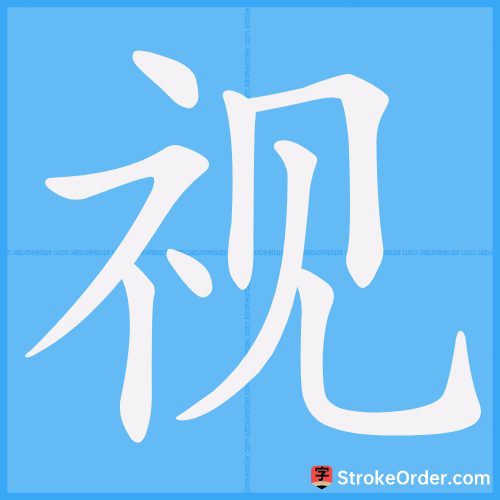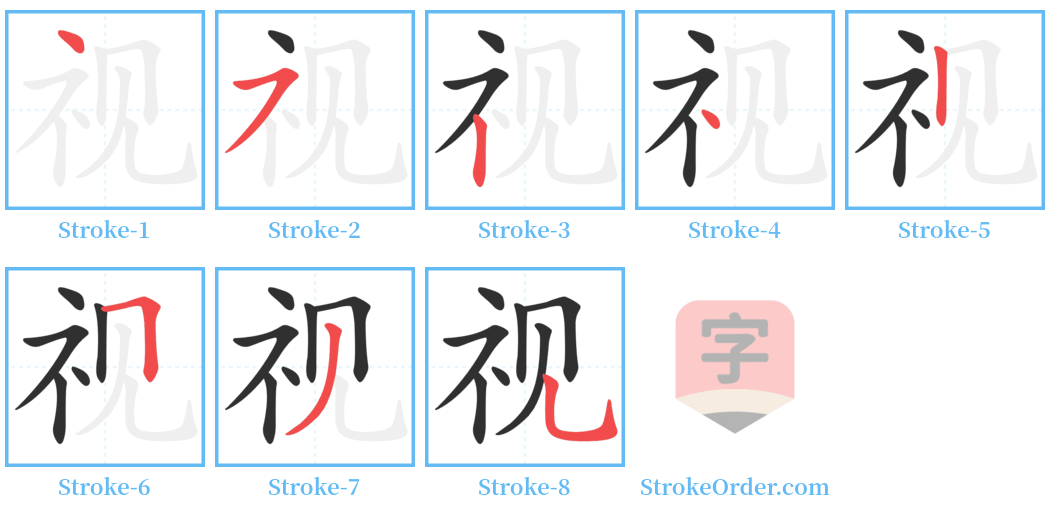视 Stroke Order
Animated Stroke Order of 视

Stroke Order Diagrams for 视

Step-by-Step Handwriting Guide for 视

Learn to Write Chinese Characters with Video Tutorials
Watch the video of writing the Chinese character "视", learn the correct stroke order (笔顺) of the character "视", and master the standard way of writing the character "视".
Free Printable Handwriting Practice with Stroke Order: 视
Printable Writing Practice Worksheet of "视" in Portrait Orientation (Tian Zi Ge)

Printable Writing Practice Worksheet of "视" in Landscape Orientation (Tian Zi Ge)

Information of 视
Pinyin
shì
Radical
见
Strokes
8 strokes
Usage
★★★★★
Definition
to look at / to regard / to inspect
视 (shì)
1. 看: To look at.
2. 亲临某事: To be present at certain events.
3. 看待: To regard or look upon.
4. 看望: To visit.
5. 比照: To compare.
6. 古同“示”,表明: An ancient word similar to “show,” to indicate.
视 (shì) [Verb]
- 本义:看 (Basic meaning: To look)
- 造字法:会意兼形声。从见示,示亦声。见,看见。示,表现。 (Character formation: Combination of ideogram and phonetic components. "见" means to see, and "示" indicates to manifest.)
1. 同本义 (To look at)
引:
- 《说文》:视,瞻也。 (In "Shuowen," it explains: To look at)
- 《书·泰誓中》:天视自我民视,天听自我民听。 (In "Shujing", it states: Heaven looks as the people look)
- 《墨子·辞过》:目不能徧视,手不能徧操。 (In "Mozi", it mentions not being able to see everywhere with the eyes)
- 《诗·郑风·子曰鸡鸣》:子兴视夜。 (In "Shijing": The son rises to look at the night)
- 《礼记·大学》:视而不见,听而不闻。 (In "Liji": To look but not see, to listen but not hear)
2. 考察,察看,审察 (To inspect)
引:
- 《论语·为政》:视其所以。 (In "Lunyu": Look into their means)
- 《左传·庄公十年》:下视其辙,登轼而望之。 (In "Zuozhuan": Look down at their traces)
3. 治理,处理 (To administer; treat)
引:
- 《左传·襄公二十五年》:崔子称疾不视事。 (In "Zuozhuan" remarks: The official didn’t attend to state affairs due to sickness)
4. 看待 (To regard; look upon)
引:
- 清·周容《芋老人传》:弃其妇,致郁郁死,是芋视乃妇也。 (In "Yulaoren Zhuan": To abandon his wife and thus cause her depression)
5. 通“示”。向…表示 (To show)
引:
- 《汉书·周勃传》:指视我。 (In "Han Shu": Point to show me)
6. 比照 (To compare)
引:
- 孙文《黄花冈七十二烈士事略序》:环顾国内,贼氛方炽。 (In Sun Wen's "Introduction to the 72 Martyrs": Looking around the country, the situation is dire)
7. 效法 (To imitate)
引:
- 《书·太甲中》:王懋乃德,视乃厥祖。 (In "Shujing": The kings emulate their ancestors)
8. 接纳 (To admit)
引:
- 《礼记·坊记》:故君子于有馈者,弗能见,则不视其馈。 (In "Liji": The gentleman does not see the gifts if unable to meet)
9. 照顾,照看 (To care for)
- 例:如:视护(照看护理) (e.g., to care for)
10. 发令 (To give order)
- 例:如:视师(督率军旅) (e.g., to command the troops)
视 (shì) [Noun]
1. 眼;眼力;视线 (Sight; vision)
引:
- 《庄子·养生主》:吾见其难为,怵然为戒,视为止,行为迟。 (In "Zhuangzi": I saw it was difficult)
2. 水名。即“涀水” (Name of a river; Shi River located in Ye County, Henan Province)
China Central Television (CCTV), abbr. for 中國中央電視台|中国中央电视台[Zhong1 guo2 Zhong1 yang1 Dian4 shi4 tai2]
look at nothing that is not consistent with propriety / not to look at things which do not conform to the rites
to obscure the facts (idiom); to mislead the public with prevarication and deliberate falsehoods
Input Method for 视
Pinyin
shi4
Wubi
pymq
Cangjie
ifbhu
Zhengma
wslr
Four Corner
37212
Unicode
U+89c6
Same Pronunciation Characters